Post by NickTheNick on Jan 3, 2016 21:17:35 GMT
Official Thrive Civilization Forum Game Competition (OTCFGC)
Meta Thread: thrivegame.freeforums.net/thread/354/otcfgc-meta-thread
Tired of waiting for the actual game to come out? Tired of the big emphasis of forum games on natural evolution?
Well welcome to the Strategy Mode spin-off of the Official Thrive Forum Game Competition (http://thrivegame.freeforums.net/thread/110/official-thrive-forum-game-competition). Instead of controlling a species, here you will lead a civilization, as you make decisions to compete with the other civilizations and avoid collapse.
Just to clarify, you won't be a civilization from the beginning. In terms of vocabulary, a tribe will refer to a nomadic people, and a civilization will refer to a sedentary people. You will transition from a tribe to a civilization when you settle down and build cities. NPC tribes and civilizations will also exist in the game.
This game will accommodate 7 players. TheCreator has been guaranteed a spot, as the creator (pun intended) of the inspiration for the game. The first 6 people to request will get to play. I won't be able to add any more than that. I don't have enough time to devote to handling that many players, and it also makes the interactions between the civilizations a lot more complex.
How do I control my civilization? What can I vote for? How will this work?
This game will use very similar rules to the original by TheCreator. You the player play as a mysterious force that guides your people through the eons. Each round of play, you can make a vote / big policy change for your people. Note that if you are nomadic, this can be choosing a direction/destination to migrate. Your votes can also be anything from choosing to wage war against a neighbour, choosing to convert your population to a new religion, choosing to research a new technology, etc. Don't worry, picking a vote in waging war on a certain target won't neglect everything else in your civilization, it will just mean that your civ will focus on the war. Throughout the game, many things will run in the background even if not directly voted for.
Votes will be rolled for like in the original. The possible outcomes are:
1 - Unsuccessful + Adverse Effect
2 - Limited Success
3 - Limited Success
4 - Successful
5 - Successful
6 - Successful + Bonus effect
(Note that the rules were changed so that 3 is now Successful)
Be aware though that you’re civilization is large and diverse and the decisions you make only push it into a certain direction. The people can get a mind of their own and you can face internal dissent and revolutions, if you are not careful. The stability of your civilization can also fluctuate based on the how well you direct them. If your stability falls too low, your civilization will collapse, and you must branch off from another civ. Depending on the stability of that civilization, this may or may not happen peacefully.
Stability ranges from:
Collapsing (-2)
Unstable (-1)
Shaky (0)
Stable (1)
Solid (2)
Stability is a combination of cultural and religious unity, quality of life, political stability, war, disease, famine, resource supply, etc. Think of it like the endangerment ranking in the original.
You also have a power rating, which represents the relative strength and influence of your people.
Power ranges from:
Tiny - 1
Minor - 2
Medium - 3
Major - 4
Great - 5
Power is a combination of military force, population, technological advantage, economic prosperity, and several other factors.
For each level of power, you will able to make 1 vote. Everyone starts at Tiny, so you all start only being able to make 1 vote, but if anyone reaches Great they will be able to make 5 votes per round. This is not necessarily better, because more power also means more responsibility, and larger, more powerful civilizations are harder to maintain and can more easily lose stability. Remember, the bigger they are, the harder they fall.
Power is also relative. You can be a great power in the bronze age by having large armies of chariots and plenty of grain, but if you are surrounded by industrial nations with machine guns and oil refineries, you will definitely lose that Great Power status.
There will be no graphics included in the gameplay (unless I decide otherwise, and this includes maps), so if you guys want details as to the landscape and your surroundings ask me and I can explain. You can create maps for yourselves as you play.
Various events can occur during play, but besides these most events will arise from interaction between your civs:
-Disease/Epidemic
-Drought/Dry season
-Fire
-Earthquake
-Volcano
-Hurricane
-Landslide
-Famine
-Resource Shortage
-Animal Attack
Votes shouldn't be too specific, nor should they be too general. If they are too specific or too general, I will tell you and give you a chance to fix it. If for the sake of time I need to get the next round posted, I will give you a decision that is as close to what you said as possible. For example, if you said you wanted to engage send a company of knights to raid Bob's lands, I will approximate that as you encouraging your soldiers to pillage lands belonging to Bob.
However, more specific votes will be more effective when successful (and more harmful when unsuccessful). If you voted to increase intelligence operations of your nation to spy on other nations, it would give you a small boost to espionage across the board, but if you were to specifically vote to increase spying against Player X, that would give you a large boost to espionage against that particular player.
In the case that you want to make a private decision, send me a private message telling me your decision, and then post a regular post on the thread saying “PM for decision sent”. This would be useful if you, say, wanted to nuke someone by surprise. You could also spend a vote to spy on a specific player, and this could allow you to intercept secret decisions if you vote successfully.
Round 0
The sun dawns on the central valleys of Eos, signalling the beginning of a new era in the history of the Cereus Xenus, or Cereans. As a result of millions of years of evolution, this species has gained sapience, and taken the first steps towards developing fire, language, and tool use. However, recent animal migrations and droughts have left their homeland devoid of food and water. The seven major tribes of Cereans must migrate to new lands (not to be confused with Syrian migrants on Earth) to seek sustenance for their people. Stories from hunters and gatherers tell of lands to the south with exotic fruits and beasts of game, but also wild and deadly predators. To the north, the legends tell of cooler weather with many forests and animals. More barren than the south, but safer as well. From the west, the valleys get drier and hotter and give way to sand. To the east, the land turns into hills and then mountains, where some scouts are able to find fresh sources of water and herds of animals, but must also face the harsher conditions of the mountainous environment. The statuses of each of the seven tribes are:
Tribe: Cereus Xenus
Stability: Stable (1)
Power: Tiny (1)
Past Policies:
Biological Description:
This first turn is unique in that instead of making a free vote, you are restricted to only voting on a direction to migrate (You may also choose to stay where you are). Next turn you may vote openly on whatever you want. You must also name your tribe.
Waiting List:
lowry
aquos
alohameanshello
serialkillerthesheep
Atrox
TheGraveKnight
bigyihsuan
GabrielGG
blackink
Will be added to waitlist upon death:
Skyguy98
evolution4weak
StealthstyleL
Maps:
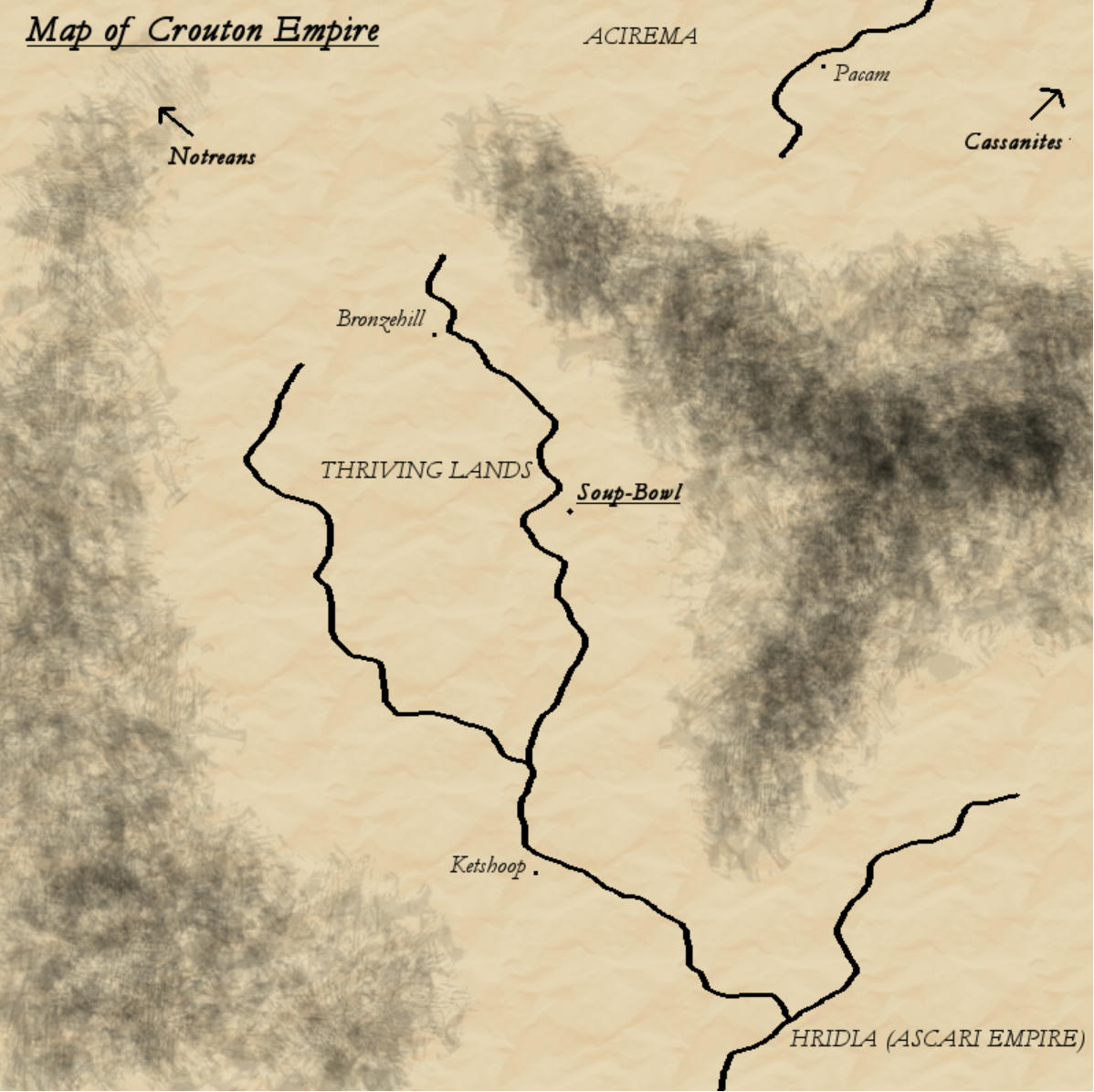
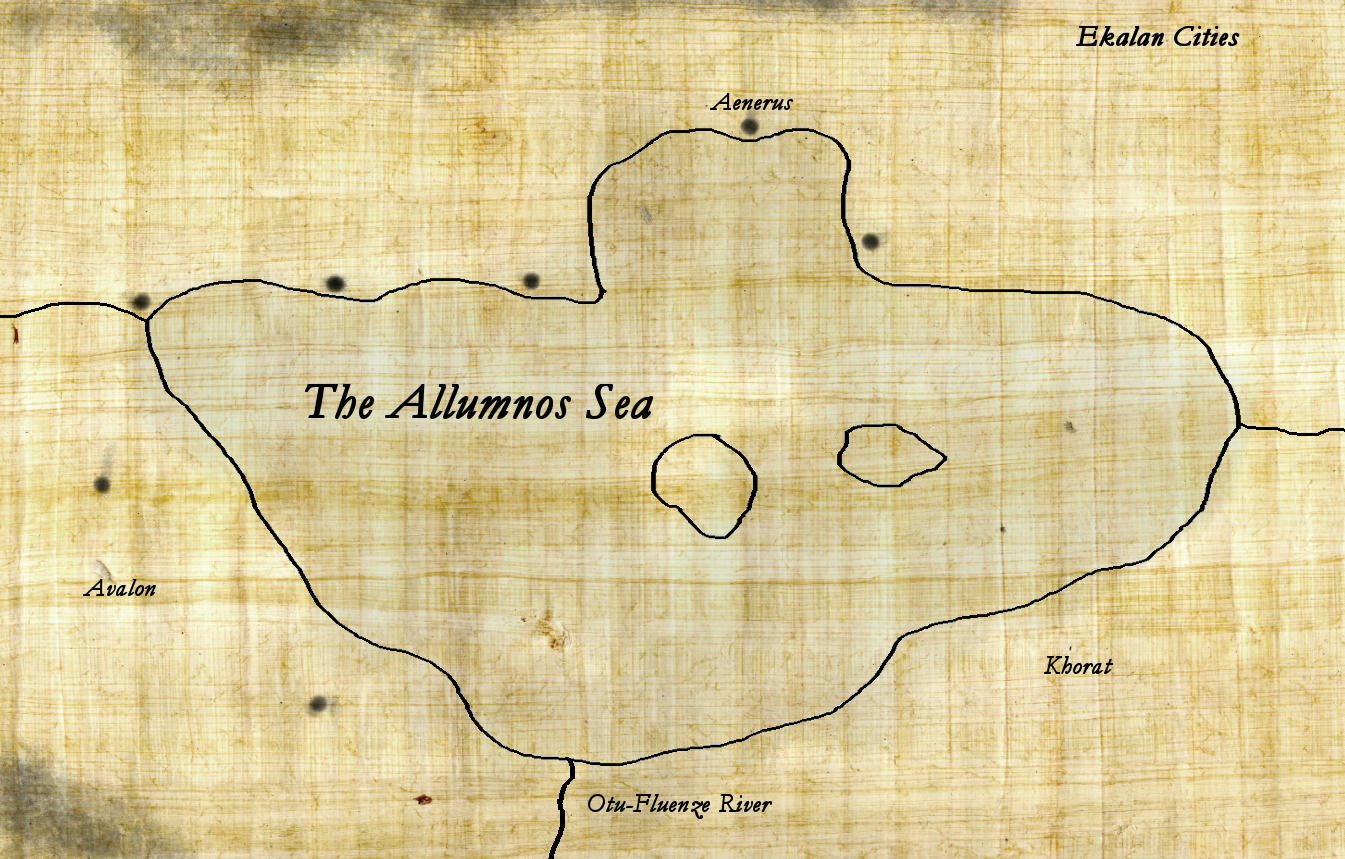
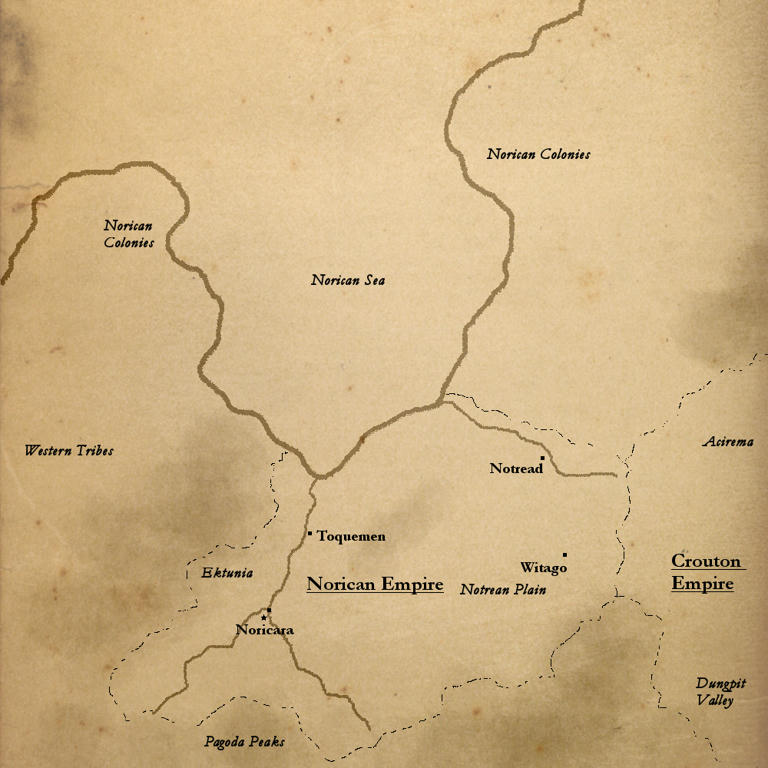
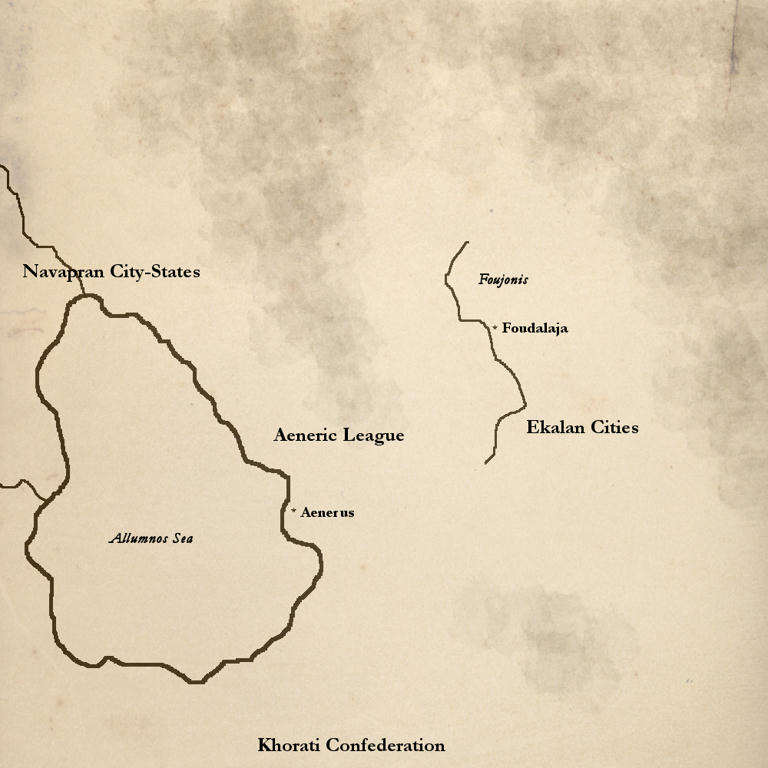
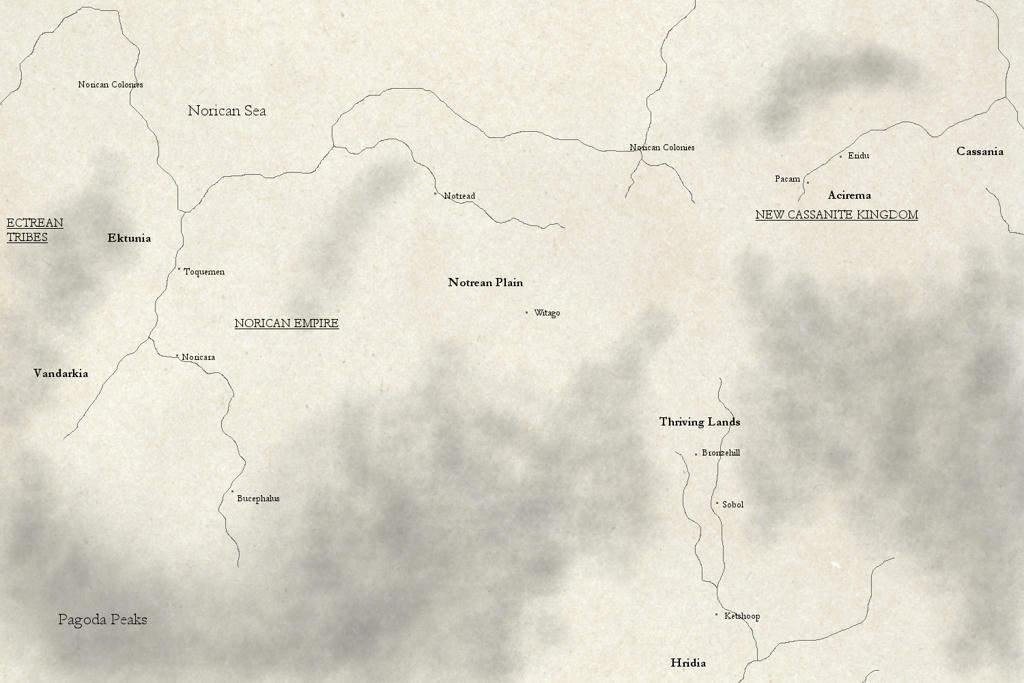
All the rounds thus far:
Round 1 : The tribes migrate out of the central valleys.
Round 2 : Some tribes continue to migrate, while others settle to hunt, gather, and fish.
Round 3 : Some migrations continue. Agriculture is first developed by the Aciremans.
Round 4 (With Pictures) : The tribes have largely settled in. Cattle are domesticated by the Notrea. Trade starts to become prominent in the north. Agriculture is developed for the second time, now in the south.
Round 5 : Bow wielding Croutons overrun the Dwemer. Religions emerge in the south. The Foukala collapse. The Notrea face raids from the Norica tribe. The Aciremans build the first cities. The Avalon tribe breaks apart.
Round 6 : Wildfire strikes the Avalon. The Notreans face increased attacks from Noricans and wild animals. The Acirema become the first civilization, and form an early government. The Ekala succeed the Foukala.
Round 7 : Disease strikes the Notreans. Agriculture and animal domestication become widespread in the north. The Aciremans build the first world wonder.
Intermission I - State of the World Address
Round 8 : The Avalon make contact with their lost tribes. Norican tribespeople build the first boats. Acirema experiences a period of peace and prosperity, but danger looms.
Round 9 : The Navapra invade the Avalon homeland. The Norica discover a sea route connecting their settlements. Epidemic sweeps through Acirema. Humlan tribal leaders finally bridge the divide between Skylos and Habrastarks. The Croutons shut themselves out from foreign trade.
Round 10 : The Avalon survivors face internal dissent. As the Norica civilize, old conflicts between Noricans and Notreans reemerge. The Cassanites make conquests into the Acirema. Civilization spreads to the Croutons, who also form the world's first army. The Humla collapse in the face of Avalon refugees and famine.
Round 11 : In the north, old powers decline as new ones gain momentum. The Acireman Kingdom crumbles in the face of Cassanite and Crouton invasions. The Notrean cities gain autonomy, and the Notrean Plains suffer renewed conflicts. Meanwhile, the Noricans and Croutons advance. The Nastra emerge, east of the Ascari, and to the south the Avalon tribe is succeeded by the Khorati.
Round 12 : The Notrean and Acireman civilizations collapse in the face of surmounting turmoil and foreign invasions. The Noricans create an army for their kingdom. The Nastra are the first peoples to develop bronze.
Intermission IIa - State of the World Address
Intermission IIb - A Tribute to the Fallen
Intermission IIc - Religions of the World
Round 13 : The Astax and Sedret tribes rise to prominence. Epidemic strikes the Crouton Empire. Pacam falls to the Crouton armies, and the Thrall Palace is destroyed. The Aeneric League is formed from several of the Navapran city-states.
Round 14 : The Norican Kingdom reconquers the independent cities, and consolidates its rule over the east, becoming the dominant power in the region. The first code of laws is created in the Crouton Empire. The Cassanite Kingdom falls apart from tribal infighting. Sedentary settlement spreads to several more tribes.
Round 15 : Technology advances in the south. The Nastran tribespeople organize under a new monarchy. In the north, the Crouton and Norican civilizations prosper in peace. The first maps are made by Crouton explorers.
Round 16 : The Khorati assimilate local tribes into a greater confederation. The Noricans construct the Spear of Rannos. The Astax tribe faces civil war. War breaks out between the Crouton and Ascari empires.
Round 17 : Writing is developed by the Khorati. The Noricans build the Library of Magnificence. The Astaxi are unified into a single kingdom from their civil war. The Ascari-Crouton war comes to a stalemate, and the Nastrans turn on their Ascari overlords. The Aeneric League faces internal rebellion.
Round 18 : The Khorati face a tribal war. The Sedreti unite under a chiefdom. Eos' first great power, the Norican Empire, emerges. The Nastrans are conquered by the Ascari. The Cassanites reappear as a united force and invade the Crouton Empire. The Aeneric League fights a civil war.
Round 19 : The Khoratis attack the renegade tribes but fail. The Ectrean Tribes appear in the north. The Noricans conquer Vandarkia, complete the Walls of Noricara, and integrate the Notreans at long last. The Croutons are collapse in the face of the Cassanite invasion. Technology advances in the south.
Round 20 : The Khorati set the Ushnuks and Kasrans to flight. The Sedreti form a monarchy. Ekalan missionaries convert the Aeneric League. The Shaowayan Kingdom emerges in northern Hridia.
Round 21 : The south modernizes in the wake of many wars. War engulfs the western tribes. The Noricans deal with civil unrest and mapping the region. The Ekalans construct the Great Temple of Foudalaja and conquer Aenerus. ThevUshnuks migrate east and found Lokhism.
Meta Thread: thrivegame.freeforums.net/thread/354/otcfgc-meta-thread
Tired of waiting for the actual game to come out? Tired of the big emphasis of forum games on natural evolution?
Well welcome to the Strategy Mode spin-off of the Official Thrive Forum Game Competition (http://thrivegame.freeforums.net/thread/110/official-thrive-forum-game-competition). Instead of controlling a species, here you will lead a civilization, as you make decisions to compete with the other civilizations and avoid collapse.
Just to clarify, you won't be a civilization from the beginning. In terms of vocabulary, a tribe will refer to a nomadic people, and a civilization will refer to a sedentary people. You will transition from a tribe to a civilization when you settle down and build cities. NPC tribes and civilizations will also exist in the game.
This game will accommodate 7 players. TheCreator has been guaranteed a spot, as the creator (pun intended) of the inspiration for the game. The first 6 people to request will get to play. I won't be able to add any more than that. I don't have enough time to devote to handling that many players, and it also makes the interactions between the civilizations a lot more complex.
How do I control my civilization? What can I vote for? How will this work?
This game will use very similar rules to the original by TheCreator. You the player play as a mysterious force that guides your people through the eons. Each round of play, you can make a vote / big policy change for your people. Note that if you are nomadic, this can be choosing a direction/destination to migrate. Your votes can also be anything from choosing to wage war against a neighbour, choosing to convert your population to a new religion, choosing to research a new technology, etc. Don't worry, picking a vote in waging war on a certain target won't neglect everything else in your civilization, it will just mean that your civ will focus on the war. Throughout the game, many things will run in the background even if not directly voted for.
Votes will be rolled for like in the original. The possible outcomes are:
1 - Unsuccessful + Adverse Effect
2 - Limited Success
3 - Limited Success
4 - Successful
5 - Successful
6 - Successful + Bonus effect
(Note that the rules were changed so that 3 is now Successful)
Be aware though that you’re civilization is large and diverse and the decisions you make only push it into a certain direction. The people can get a mind of their own and you can face internal dissent and revolutions, if you are not careful. The stability of your civilization can also fluctuate based on the how well you direct them. If your stability falls too low, your civilization will collapse, and you must branch off from another civ. Depending on the stability of that civilization, this may or may not happen peacefully.
Stability ranges from:
Collapsing (-2)
Unstable (-1)
Shaky (0)
Stable (1)
Solid (2)
Stability is a combination of cultural and religious unity, quality of life, political stability, war, disease, famine, resource supply, etc. Think of it like the endangerment ranking in the original.
You also have a power rating, which represents the relative strength and influence of your people.
Power ranges from:
Tiny - 1
Minor - 2
Medium - 3
Major - 4
Great - 5
Power is a combination of military force, population, technological advantage, economic prosperity, and several other factors.
For each level of power, you will able to make 1 vote. Everyone starts at Tiny, so you all start only being able to make 1 vote, but if anyone reaches Great they will be able to make 5 votes per round. This is not necessarily better, because more power also means more responsibility, and larger, more powerful civilizations are harder to maintain and can more easily lose stability. Remember, the bigger they are, the harder they fall.
Power is also relative. You can be a great power in the bronze age by having large armies of chariots and plenty of grain, but if you are surrounded by industrial nations with machine guns and oil refineries, you will definitely lose that Great Power status.
There will be no graphics included in the gameplay (unless I decide otherwise, and this includes maps), so if you guys want details as to the landscape and your surroundings ask me and I can explain. You can create maps for yourselves as you play.
Various events can occur during play, but besides these most events will arise from interaction between your civs:
-Disease/Epidemic
-Drought/Dry season
-Fire
-Earthquake
-Volcano
-Hurricane
-Landslide
-Famine
-Resource Shortage
-Animal Attack
Votes shouldn't be too specific, nor should they be too general. If they are too specific or too general, I will tell you and give you a chance to fix it. If for the sake of time I need to get the next round posted, I will give you a decision that is as close to what you said as possible. For example, if you said you wanted to engage send a company of knights to raid Bob's lands, I will approximate that as you encouraging your soldiers to pillage lands belonging to Bob.
However, more specific votes will be more effective when successful (and more harmful when unsuccessful). If you voted to increase intelligence operations of your nation to spy on other nations, it would give you a small boost to espionage across the board, but if you were to specifically vote to increase spying against Player X, that would give you a large boost to espionage against that particular player.
In the case that you want to make a private decision, send me a private message telling me your decision, and then post a regular post on the thread saying “PM for decision sent”. This would be useful if you, say, wanted to nuke someone by surprise. You could also spend a vote to spy on a specific player, and this could allow you to intercept secret decisions if you vote successfully.
Round 0
The sun dawns on the central valleys of Eos, signalling the beginning of a new era in the history of the Cereus Xenus, or Cereans. As a result of millions of years of evolution, this species has gained sapience, and taken the first steps towards developing fire, language, and tool use. However, recent animal migrations and droughts have left their homeland devoid of food and water. The seven major tribes of Cereans must migrate to new lands (not to be confused with Syrian migrants on Earth) to seek sustenance for their people. Stories from hunters and gatherers tell of lands to the south with exotic fruits and beasts of game, but also wild and deadly predators. To the north, the legends tell of cooler weather with many forests and animals. More barren than the south, but safer as well. From the west, the valleys get drier and hotter and give way to sand. To the east, the land turns into hills and then mountains, where some scouts are able to find fresh sources of water and herds of animals, but must also face the harsher conditions of the mountainous environment. The statuses of each of the seven tribes are:
Tribe: Cereus Xenus
Stability: Stable (1)
Power: Tiny (1)
Past Policies:
Sapience: Your species has gained the wisdom and intelligence necessary for complex thought
Language: Your people have developed an oral communication to allow for complex exchange of information and more intricate levels of cooperation.
Oral Tradition: Your people pass knowledge down orally from generation to generation, allowing practices of hunting, animal interaction, and culture to be retained and refined over the years.
Mysticism: With sapience, your people have begun to think about deities higher than themselves, and now practice worship of these gods.
Fire: Your people have learned how to create and control fire. Through this they have begun to cook their food. They also have applied fire to heating materials during crafting and to scare away predators. Fires have developed as a central hub for the activities of your tribe.
Tool Use: Your people have adapted materials in their environment into simple tools for hunting, crafting, and combat, often shaped out of flint or other soft stones.
Language: Your people have developed an oral communication to allow for complex exchange of information and more intricate levels of cooperation.
Oral Tradition: Your people pass knowledge down orally from generation to generation, allowing practices of hunting, animal interaction, and culture to be retained and refined over the years.
Mysticism: With sapience, your people have begun to think about deities higher than themselves, and now practice worship of these gods.
Fire: Your people have learned how to create and control fire. Through this they have begun to cook their food. They also have applied fire to heating materials during crafting and to scare away predators. Fires have developed as a central hub for the activities of your tribe.
Tool Use: Your people have adapted materials in their environment into simple tools for hunting, crafting, and combat, often shaped out of flint or other soft stones.
Biological Description:
Cereans are an omnivorous, bipedal, humanoid species, with two hands, two feet, and no tails, on a very Earthlike planet (Eos). Their skin colour that ranges through different shades of beige, reddish-brown, and orange. They don’t have much hair save for some on their arms, legs, and a ring around the backs of their head (meaning their sides and top are bald). I will leave the exact details of the shapes of their faces to your imagination, but imagine it similar to humans. Cereans are agile hunters that work in groups.
By a miraculous happenstance in the universe, not only are the Cereans extremely similar to Humans in most respects, the flora and fauna of Eos is likewise remarkably alike to that of Earth. Common beasts of game for the Cereans include species that very closely resemble those humans would hunt.
By a miraculous happenstance in the universe, not only are the Cereans extremely similar to Humans in most respects, the flora and fauna of Eos is likewise remarkably alike to that of Earth. Common beasts of game for the Cereans include species that very closely resemble those humans would hunt.
This first turn is unique in that instead of making a free vote, you are restricted to only voting on a direction to migrate (You may also choose to stay where you are). Next turn you may vote openly on whatever you want. You must also name your tribe.
Waiting List:
lowry
aquos
alohameanshello
serialkillerthesheep
Atrox
TheGraveKnight
bigyihsuan
GabrielGG
blackink
Will be added to waitlist upon death:
Skyguy98
evolution4weak
StealthstyleL
Maps:





All the rounds thus far:
Round 1 : The tribes migrate out of the central valleys.
Round 2 : Some tribes continue to migrate, while others settle to hunt, gather, and fish.
Round 3 : Some migrations continue. Agriculture is first developed by the Aciremans.
Round 4 (With Pictures) : The tribes have largely settled in. Cattle are domesticated by the Notrea. Trade starts to become prominent in the north. Agriculture is developed for the second time, now in the south.
Round 5 : Bow wielding Croutons overrun the Dwemer. Religions emerge in the south. The Foukala collapse. The Notrea face raids from the Norica tribe. The Aciremans build the first cities. The Avalon tribe breaks apart.
Round 6 : Wildfire strikes the Avalon. The Notreans face increased attacks from Noricans and wild animals. The Acirema become the first civilization, and form an early government. The Ekala succeed the Foukala.
Round 7 : Disease strikes the Notreans. Agriculture and animal domestication become widespread in the north. The Aciremans build the first world wonder.
Intermission I - State of the World Address
Round 8 : The Avalon make contact with their lost tribes. Norican tribespeople build the first boats. Acirema experiences a period of peace and prosperity, but danger looms.
Round 9 : The Navapra invade the Avalon homeland. The Norica discover a sea route connecting their settlements. Epidemic sweeps through Acirema. Humlan tribal leaders finally bridge the divide between Skylos and Habrastarks. The Croutons shut themselves out from foreign trade.
Round 10 : The Avalon survivors face internal dissent. As the Norica civilize, old conflicts between Noricans and Notreans reemerge. The Cassanites make conquests into the Acirema. Civilization spreads to the Croutons, who also form the world's first army. The Humla collapse in the face of Avalon refugees and famine.
Round 11 : In the north, old powers decline as new ones gain momentum. The Acireman Kingdom crumbles in the face of Cassanite and Crouton invasions. The Notrean cities gain autonomy, and the Notrean Plains suffer renewed conflicts. Meanwhile, the Noricans and Croutons advance. The Nastra emerge, east of the Ascari, and to the south the Avalon tribe is succeeded by the Khorati.
Round 12 : The Notrean and Acireman civilizations collapse in the face of surmounting turmoil and foreign invasions. The Noricans create an army for their kingdom. The Nastra are the first peoples to develop bronze.
Intermission IIa - State of the World Address
Intermission IIb - A Tribute to the Fallen
Intermission IIc - Religions of the World
Round 13 : The Astax and Sedret tribes rise to prominence. Epidemic strikes the Crouton Empire. Pacam falls to the Crouton armies, and the Thrall Palace is destroyed. The Aeneric League is formed from several of the Navapran city-states.
Round 14 : The Norican Kingdom reconquers the independent cities, and consolidates its rule over the east, becoming the dominant power in the region. The first code of laws is created in the Crouton Empire. The Cassanite Kingdom falls apart from tribal infighting. Sedentary settlement spreads to several more tribes.
Round 15 : Technology advances in the south. The Nastran tribespeople organize under a new monarchy. In the north, the Crouton and Norican civilizations prosper in peace. The first maps are made by Crouton explorers.
Round 16 : The Khorati assimilate local tribes into a greater confederation. The Noricans construct the Spear of Rannos. The Astax tribe faces civil war. War breaks out between the Crouton and Ascari empires.
Round 17 : Writing is developed by the Khorati. The Noricans build the Library of Magnificence. The Astaxi are unified into a single kingdom from their civil war. The Ascari-Crouton war comes to a stalemate, and the Nastrans turn on their Ascari overlords. The Aeneric League faces internal rebellion.
Round 18 : The Khorati face a tribal war. The Sedreti unite under a chiefdom. Eos' first great power, the Norican Empire, emerges. The Nastrans are conquered by the Ascari. The Cassanites reappear as a united force and invade the Crouton Empire. The Aeneric League fights a civil war.
Round 19 : The Khoratis attack the renegade tribes but fail. The Ectrean Tribes appear in the north. The Noricans conquer Vandarkia, complete the Walls of Noricara, and integrate the Notreans at long last. The Croutons are collapse in the face of the Cassanite invasion. Technology advances in the south.
Round 20 : The Khorati set the Ushnuks and Kasrans to flight. The Sedreti form a monarchy. Ekalan missionaries convert the Aeneric League. The Shaowayan Kingdom emerges in northern Hridia.
Round 21 : The south modernizes in the wake of many wars. War engulfs the western tribes. The Noricans deal with civil unrest and mapping the region. The Ekalans construct the Great Temple of Foudalaja and conquer Aenerus. ThevUshnuks migrate east and found Lokhism.









